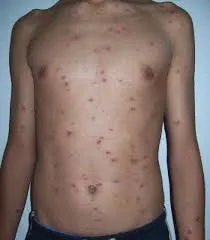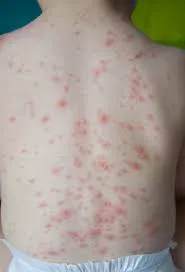Chickenpox is a disease caused by the varicella-zoster virus. It is highly contagious, and can be spread by contact with infected people or things they have touched, such as bedding or clothing. The virus may also be spread by breathing in the air near an infected person who has a cough or sneezing. There are no specific treatments for chickenpox but symptoms can be relieved with medication and fluids to prevent dehydration. People with chickenpox should stay at home until they have been free of spots for at least five days to avoid infecting other people.
Chickenpox is a disease that is caused by the varicella-zoster virus. It is also known as varicella and can lead to some serious health problems. The virus spreads from one person to another through respiratory droplets and through contact with fluid from the blisters on the skin. Chickenpox usually starts with a fever, headache, and an itchy rash that looks like red spots on top of the skin. The rash continues to spread for about five days before it starts to fade away. In some cases, chickenpox can also lead to complications such as pneumonia or encephalitis (swelling of the brain).
The virus that causes chickenpox is called varicella-zoster virus. It is a member of the herpes family of viruses. The virus is spread through the air and by direct contact with fluid from the blisters. The incubation period for chickenpox is 10-21 days, but it can be as long as three weeks before symptoms appear. After an infected person recovers from chickenpox, they are immune to the disease for life.

Chickenpox is a very common, contagious disease caused by the varicella-zoster virus, which is spread through the air or direct contact with fluid from an infected person.
The disease starts with a fever and headache, followed by a rash of red spots or bumps that can appear anywhere on the body. The rash usually lasts five to 10 days. Chicken pox is a common childhood illness caused by the varicella zoster virus. It is also called Varicella. The virus causes an itchy rash with blisters all over the body, fever, tiredness and loss of appetite.
The virus spreads from person to person through droplets that come out of the mouth and nose when someone has chickenpox or talks with someone who has it. It can also spread through contact with fluid from the blisters on the skin of a person who has chickenpox. The virus can be prevented by getting vaccinated prior to exposure to it, by washing hands frequently and avoiding contact with people who have it, or by staying away from people who have it until they are no longer contagious.
Chickenpox is a common, contagious disease that affects the skin. It is caused by a virus called varicella-zoster. The virus spreads from person to person through the air, or through direct contact with fluid from the blisters.
The infection can cause fever and other symptoms. It can be life threatening for some people. Chickenpox usually lasts about five days and goes away without any treatment.
The infection can be prevented by getting vaccinated with chickenpox vaccine, which will not give you chickenpox but will protect you from getting it in the future; or by staying away from people who have chickenpox until they are no longer contagious (usually 5 days).

Chickenpox is a common illness that affects children and adults. It is caused by the varicella-zoster virus (VZV). The virus causes a blistering rash that can be accompanied by fever, tiredness, headache, and loss of appetite. Symptoms usually start about 10 to 21 days after exposure to someone with the virus. If you are not sick or are not sure if you have chickenpox, see your doctor for testing and treatment.
Chickenpox is a common illness that affects children and adults. It is caused by the varicella zoster virus, which causes a rash that looks like chickenpox. The infection can spread from person to person through droplets in the air or contact with fluid or tissue of an infected person. The infection causes inflammation of the skin and nearby tissues, fever, tiredness, headache, and sore throat. It is not usually serious but in rare cases it can cause complications such as pneumonia (lung infection) or encephalitis (brain swelling).
The virus stays in the body for life so it can cause shingles (painful rash) later on in life. There is no specific treatment for chickenpox but there are some treatments for complications such as antibiotics for pneumonia and antiviral medicines to reduce brain swelling. Chickenpox is an infectious disease caused by the varicella-zoster virus. It is highly contagious and can be spread through droplets from coughing, sneezing, or talking.
The infection starts with a fever, followed by a rash characterized by red bumps that are filled with fluid and itch. The infected person may also have swollen glands and feel tired.
This section discusses about the infection body system life health death treatment causes prevention symptoms control sickness of chickenpox.
(1). https://www.britannica.com/science/chickenpox
(2). https://www.everydayhealth.com/chickenpox/
(3). https://www.healthline.com/health/chickenpox#symptoms
(4). https://www.mayoclinic.org/diseases-conditions/chickenpox/symptoms-causes/syc-20351282
(5). https://my.clevelandclinic.org/health/diseases/4017-chickenpox
